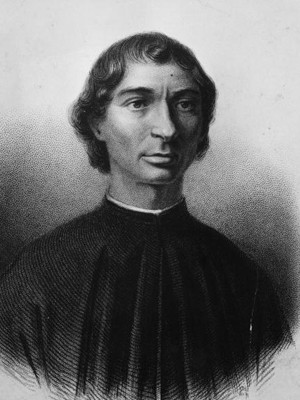mercredi, 13 février 2019
Karlheinz Weißmann: Der Konservative und die Rechte - Ein gespanntes Verhaeltnis

Karlheinz Weißmann: Der Konservative und die Rechte - Ein gespanntes Verhaeltnis
00:34 Publié dans Actualité, Théorie politique | Lien permanent | Commentaires (0) | Tags : karlheinz weissmann, actualité, conservatisme, droite, populisme, bonapartisme, théorie politique, philosophie politique, sciences politiques, histoire, politologie |  |
|  del.icio.us |
del.icio.us |  |
|  Digg |
Digg | ![]() Facebook
Facebook
jeudi, 19 janvier 2012
Bonapartism - Machiavellianism - Elitism
Bonapartism - Machiavellianism - Elitism
di Troy Southgate
Ex: http://www.juliusevola.it/
 Bonapartism is a rather unusual term and one which Evola borrows from R. Michels, author of the 1915 work Political Parties: A Sociological Study of the Oligarchical Tendencies of Modern Democracy. Michels demonstrates how representative democracy and "government of the people" leads to the control of the State by a self-interested minority. This view is echoed by J. Burnham in The Machiavellians, who explains that the so-called "will of the people" is eventually superseded by the domination of a bureaucratic clique. Thus Bonapartism begins with a popular demand for more freedom and equality and ends in the totalitarian "dictatorship of the proletariat." Evola likens this process to a people who have catastrophically "led and disciplined themselves." After the decline of its aristocratic nobility, ancient Greece witnessed the same systematically repressive phenomenon. Power simply became detached from a higher, spiritual authority, leading to fear and brutality. Evola then turns to Otto Weininger, who once "described the figure of the great politician as one who is a despot and at the same time a worshipper of the people, or simultaneously a pimp and a whore." Indeed, by seeking to appeal to the masses the modern leader easily commands their respect and adulation. Not in the way that traditional societies gave their loyalty to the organic State, however, because instead of engendering a healthy diversity between the various levels (not classes) of society Bonapartism forces the politician to become a "man of the people." Therefore he is perceived as a common man, rather than as someone exceptionally transcendent and symbolic. This, Weininger called "mutual prostitution." Authority is perfectly useless unless it is attached to a central idea which runs throughout the social fabric and acts as a point of reference. This affects the individual because one "is restricted not so much in this or that exterior freedom (which is, after all, of little consequence) but rather in the inner freedom - the ability to free himself from his lowest instincts." Bonapartism - which Evola interprets here as a political, rather than militaristic, term - is equated with dictatorship because this is the logical result of its democratic ethos. It completely erodes the traditional values of human existence, refusing to "distinguish clearly between the symbol, the function, and the principle, on the one hand, and man as an individual, on the other." Instead, it rejects "that a man be valued and recognised in terms of the idea and principle he upholds" and simply views man in terms of "his action upon the irrational forms of the masses." Similarly, Evola points out the errors which began with Social-Darwinism and consequently found expression in Nietzsche’s concept of the Superman (Ubermensch): "most people, even when they admit the notion of aristocracy in principle, ultimately settle for a very limited view of it: they admire an individual for being exceptional and brilliant, instead of for being one in whom a tradition and a special 'spiritual race' shine forth, or instead of whose greatness is due not to his human virtues, but rather to the principle, the idea, and a certain regal impersonality that he embodies."
Bonapartism is a rather unusual term and one which Evola borrows from R. Michels, author of the 1915 work Political Parties: A Sociological Study of the Oligarchical Tendencies of Modern Democracy. Michels demonstrates how representative democracy and "government of the people" leads to the control of the State by a self-interested minority. This view is echoed by J. Burnham in The Machiavellians, who explains that the so-called "will of the people" is eventually superseded by the domination of a bureaucratic clique. Thus Bonapartism begins with a popular demand for more freedom and equality and ends in the totalitarian "dictatorship of the proletariat." Evola likens this process to a people who have catastrophically "led and disciplined themselves." After the decline of its aristocratic nobility, ancient Greece witnessed the same systematically repressive phenomenon. Power simply became detached from a higher, spiritual authority, leading to fear and brutality. Evola then turns to Otto Weininger, who once "described the figure of the great politician as one who is a despot and at the same time a worshipper of the people, or simultaneously a pimp and a whore." Indeed, by seeking to appeal to the masses the modern leader easily commands their respect and adulation. Not in the way that traditional societies gave their loyalty to the organic State, however, because instead of engendering a healthy diversity between the various levels (not classes) of society Bonapartism forces the politician to become a "man of the people." Therefore he is perceived as a common man, rather than as someone exceptionally transcendent and symbolic. This, Weininger called "mutual prostitution." Authority is perfectly useless unless it is attached to a central idea which runs throughout the social fabric and acts as a point of reference. This affects the individual because one "is restricted not so much in this or that exterior freedom (which is, after all, of little consequence) but rather in the inner freedom - the ability to free himself from his lowest instincts." Bonapartism - which Evola interprets here as a political, rather than militaristic, term - is equated with dictatorship because this is the logical result of its democratic ethos. It completely erodes the traditional values of human existence, refusing to "distinguish clearly between the symbol, the function, and the principle, on the one hand, and man as an individual, on the other." Instead, it rejects "that a man be valued and recognised in terms of the idea and principle he upholds" and simply views man in terms of "his action upon the irrational forms of the masses." Similarly, Evola points out the errors which began with Social-Darwinism and consequently found expression in Nietzsche’s concept of the Superman (Ubermensch): "most people, even when they admit the notion of aristocracy in principle, ultimately settle for a very limited view of it: they admire an individual for being exceptional and brilliant, instead of for being one in whom a tradition and a special 'spiritual race' shine forth, or instead of whose greatness is due not to his human virtues, but rather to the principle, the idea, and a certain regal impersonality that he embodies."
Machiavellianism - despite its frequent portrayal as an aristocratic notion - is also a highly individualist philosophy. Indeed, although the concept of The Prince rejects democracy and the masses, it makes the fatal mistake of encouraging power and authority to reside in the hands of man. In other words, man is himself the be all and end all of Machiavellian doctrine. Such men are not connected to a chain of Tradition, they are merely interested in deploying their political capabilities to advance their own interests. His very position is maintained by lies, deceit and manipulation, becoming a rampant political monster to which everything must be methodically subjected. This is clearly very different to the way in which traditional aristocracies functioned and indicates that Machiavellianism is a consequence of the general decline. True elitism, argues Evola, degenerates in four stages: "in the first stage the elite has a purely spiritual character, embodying what may be generally called ‘divine right’. This elite expresses an ideal of immaterial virility. In the second stage, the elite has the character of warrior nobility; at the third stage we find the advent of oligarchies of a plutocratic and capitalistic nature, such as they arise in democracies; the fourth and last elite is that of the collectivist and revolutionary leaders of the Fourth Estate."
Troy Southgate examines late Italian philosopher Julius Evola’s Men Among the Ruins: Post-War Reflections of a Radical Traditionalist. This is chapter 5 ( n.d.r. )
00:05 Publié dans Traditions | Lien permanent | Commentaires (0) | Tags : tradition, traditionalisme, machivalisme, bonapartisme, élitisme, philosophie |  |
|  del.icio.us |
del.icio.us |  |
|  Digg |
Digg | ![]() Facebook
Facebook


